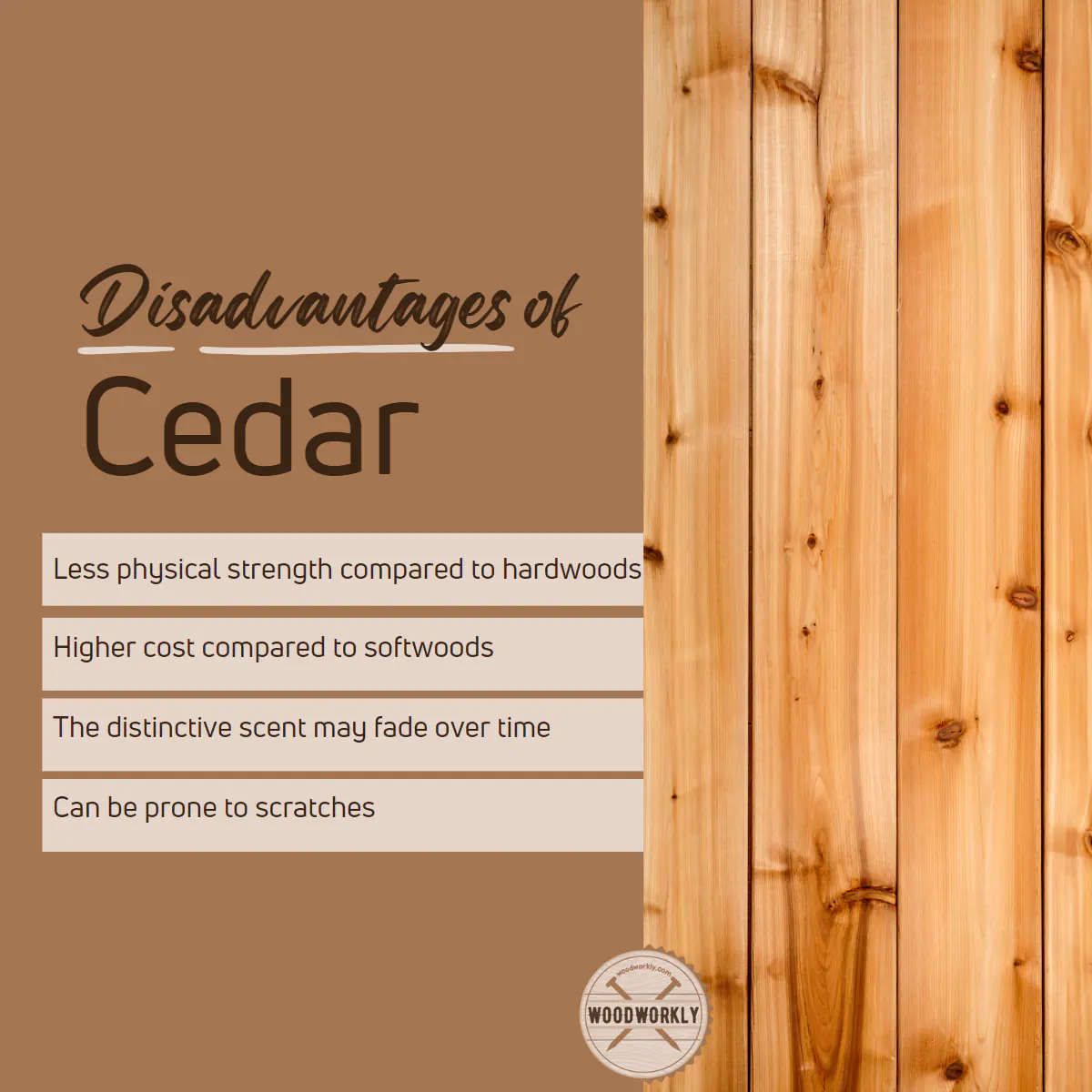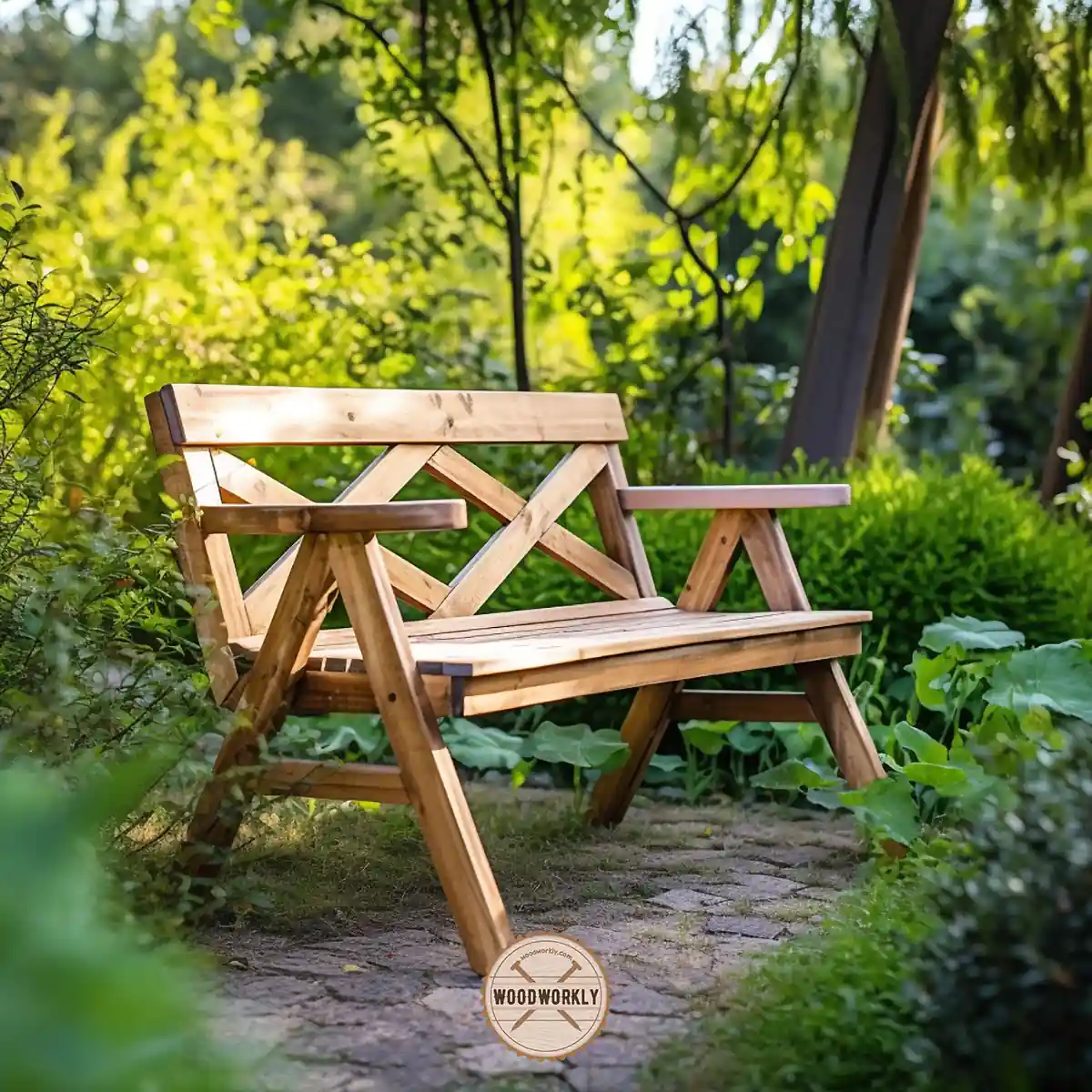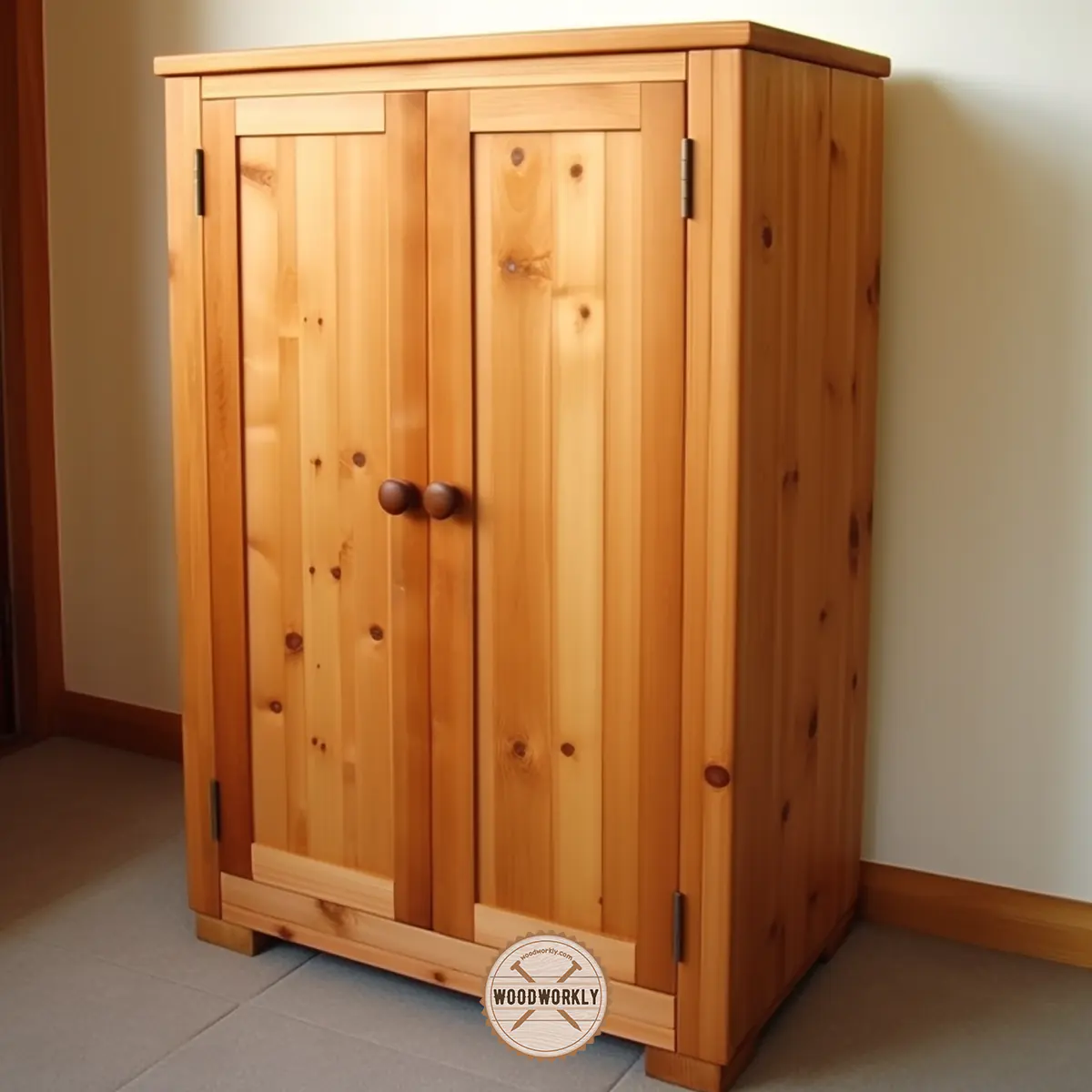Ever wondered, “Is cedar a strong wood?” Let’s embark on a journey into the world of cedar, exploring its strength and where it really shines. Ready to uncover the hidden strengths of this remarkable wood?

Cedar is a domestic wood that grows on the east and west coasts of the US. It has some great qualities that are important in woodworking.
Overall, Cedar is a versatile wood with so many uses in the woodworking world.
Due to its excellent features, I was curious about its strength and tested many cedar wood furniture and woodwork for stress tests.
Here’s what I’ve identified with all those stress tests.
So, let’s find out, Is Cedar a strong wood?
Yes, Cedar is a strong wood with relatively high compressive strength, bending strength, and durability than many other kinds of wood. Because of being a strong softwood, Cedar is less likely to crack and warp. Cedar has good dimensional stability that can use for furniture, flooring, and construction.
But there’s a lot more to know about the strength of Cedar wood.

In this article, I’ll explore whether is Cedar a strong wood, the advantages and disadvantages of cedar and applications of cedar in terms of its strength, and lot more.
Furthermore, I’ll answer some frequently asked questions as well.
Let’s jump in!

How Strong Is Cedar?
Cedar is a generally strong wood compared to many softwoods and some hardwoods as well.
The strengths of Cedar are different from species to species even though they’re from the same family.
For example, Red Aromatic Cedar is stronger than Red Cedar and Red Cedar is stronger than White Cedar.
The compressive strength and bending strengths of Cedar wood species are as follows,
| Wood Type | Compressive Strength | Bending Strength |
| Aromatic Red Cedar | 6,020 psi | 8,800 psi |
| Western Red Cedar | 4,560 psi | 7,500 psi |
| White Cedar | 3,960 psi | 6,500 psi |
As you can see there’s a huge difference between Cedar wood species in terms of their strength.
So, make sure to pick the right Cedar for your woodworking applications for a better outcome.
The strength of wood does not always depend on the compressive and bending strength.

There’re some other values as well which help to get an idea about its strength.
The strength of Cedar depends on the values of several other factors as well. They are,
- Density
- Hardness
- Stiffness
So, let’s find out what are the values of the above factors to determine how strong is Cedar.
| Wood Type | Density | Stiffness |
| Aromatic Red Cedar | 0.47 kg/m3 | 0.88 Mpsi |
| Western Red Cedar | 0.32 kg/m3 | 1.11 Mpsi |
| White Cedar | 0.32 kg/m3 | 0.80 Mpsi |
As you can see densities of Cedar wood species are low. This is why Cedar wood is lightweight and has an excellent strength-to-weight ratio.
Its strength is significant according to the weight of the wood.
Cedar comes from a large, coniferous evergreen tree. Therefore, it is a softwood. But in terms of strength, it has excellent durability.
For example, Cedar is stronger than aspen and ash which are known as hardwoods.

Compressive Strength of Cedar Compared to Other Woods
By referring following chart, you can get an idea about is Cedar a strong wood in compressive strength compared to other popular wood types.
| Wood Type | Compressive Strength |
| Aromatic Red Cedar | 6,020 psi |
| Western Red Cedar | 4,560 psi |
| White Cedar | 3,960 psi |
| Ash | 5,820 psi |
| Aspen | 4,250 psi |
| Beech | 7,300 psi |
| Cherry | 7,110 psi |
| Chestnut | 5,320 psi |
| Hard Maple | 7,830 psi |
| Soft Maple | 6,540 psi |
| Red Oak | 6,760 psi |
| Poplar | 5,540 psi |
| Walnut | 7,580 psi |
| Douglas Fir | 7,230 psi |
| Hemlock | 7,200 psi |
| Sugar Pine | 4,460 psi |
| White Pine | 4,800 psi |
| Spruce | 5,610 psi |
| Basswood | 4,730 psi |
| Hickory | 9,210 psi |
As you can see compressive strengths of Cedarwood species are in a stable position compared to other wood types.

So, let’s find out the advantages and disadvantages of Cedar in terms of its strength.
Cedar Pros and Cons
| Pros | Cons |
| High compressive strength | Fades color over time |
| High bending strength | Softwood |
| High durability | Need High maintenance |
| Lightweight | Flammable |
| Resistant against Crack and Warp | |
| Affordable | |
| Temperature resistant | |
| High workability | |
| Excellent dimensional stability | |
| Versatile |
As you can see Cedar comes with lots of benefits. It can basically use for any woodworking project.
If you’re looking for strong wood with lightweight at the same time, Cedar is the best wood for you.

Is Cedar Good for Furniture In terms Of Strength?
Cedar is an excellent wood for furniture. It has generally higher strength than most hardwoods and softwoods.
Plus, it is lightweight and can withstand many environmental elements because of its high dimensional stability.
Among many different types of Cedar woods, Eastern and western Cedar are the popular wood types for furniture.
This is because of their high strength than White Cedar.
Cedar wood can use for both indoor and outdoor furniture. But because of having good weather resistance, Cedar is well known for outdoor furniture.
Because of having a good resistance against outdoor elements, Cedar can use as an alternative wood for hardwood Teak for less money and less heavy.
Here’re the popular furniture types you can build using Cedar,
- Chests
- Tables
- Chairs
- Beds
- Desks
- Dressers
- Cupboards
- Sofas
Cedar furniture is strong and durable. They can easily last over decades with proper finishing and maintenance.
Cedar furniture is less likely to crack and warp. Western Red Cedar contains organic oil that repels bugs and insects.
It will minimize pest invasions and help to protect your Cedar furniture from bugs and insect attacks.
Cedar wood has excellent resistance to temperature changes. Therefore, Cedar wood furniture stays cool even on hot days. Cedar doesn’t absorb much heat.
Cedar is mostly used as a fencing material. It is durable and withstands outdoor weather conditions.
Cedar fences are lightweight and resistant to insect damage and rotting.
Plus, the wood does not need to be treated because it already has natural chemicals that protect the wood.
Cedar fences and other outdoor woodwork withstand for a long time.

Is Cedar Strong Enough For a Bench?
Cedar is strong enough for a bench. The bench is woodwork that frequently needs to deal with force and pressure.
So, the material that you need to use for the bench should have good compressive strength to bear under high compression and it should have good flexural strength to work against pressure without splitting the board.
Cedar wood has both high compressive strength and high flexural strength. Therefore, we can consider Cedar wood is strong enough for a bench.
Compressive strength is how much weight/force can be bear before the wood crack or breaks.
Western Red Cedar wood has a compressive strength of 4,560 psi and flexural strength of 3,300 psi which are significantly high and excellent to work as bench material.
It has good strength and flexibility at the same time.

Is Cedar Strong Enough for Cabinets
Yes, Cedar is strong enough for cabinets. It is a durable, versatile wood that thrives in damp climates. Cedar wood doesn’t shrink, warp, swell or decay easily.
Therefore, cabinets made of Cedar last over decades with proper maintenance.
As interior woodwork, we need to focus on the appearance of the wood that we use for cabinetry.
Cedar has a beautiful appearance with nice color. Cedar takes stain well and finishing is also easy.
It comes with nice red and white color combinations.
Even a beginner in woodworking can work with Cedar to make cabinetry because the wood has high stability and high workability.
Nailing, gluing, screwing, and cutting are easy because of having good strength and stability.

Is Cedar a Hardwood?
No, Cedar is a softwood since it comes from a coniferous, evergreen tree. It has less density than hardwoods. Even though Cedar is considered softwood, it has a superior strength-to-weight ratio.
According to the Janka hardness ratings, Cedar has hardness ratings as follows,
- Aromatic Red Cedar has a hardness of 900 lbf (4,003 N)
- Western Red Cedar has a hardness of 350 lbf (1,557 N)
- White Cedar has a hardness of 320 lbf (1,335 N)
As you can see there’s a huge difference between aromatic Red Cedar and Western Red Cedar in terms of hardness. The hardness of three species of Cedar varies over a long range.
Therefore, Always make sure to select the right option for your woodworking projects, because Cedar is like a whole new category that spread through a hardness scale from low to high.
Janka hardness test is a standard method of measuring the hardness of any wood according to its resistance to wear and tear. Woods with high wear and dent resistance, score higher ratings on the Janka hardness rating scale.
Cedar Wood Hardness Comparison
Here’re the hardness ratings of popular woods that we mostly use for woodworking projects. From this scale, you can get an idea about the strength and hardness of Cedar compared to other wood types.
| Wood species | Hardness value |
| Brazilian Walnut | 3,684 lbf (16,390 N) |
| Red Mahogany, Turpentine | 2,697 lbf (12,000 N) |
| Brazilian Cherry, Jatoba | 2,350 lbf (10,500 N) |
| Golden Teak | 2,330 lbf (10,400 N) |
| Hickory, Pecan, Satinwood | 1,820 lbf (8,100 N) |
| Hard Maple, Sugar Maple | 1,450 lbf (6,400 N) |
| White Oak | 1,360 lbf (6,000 N) |
| Ash (White) | 1,320 lbf (5,900 N) |
| American Beech | 1,300 lbf (5,800 N) |
| Red Oak (Northern) | 1,290 lbf (5,700 N) |
| Yellow Birch / Baltic birch | 1,260 lbf (5,600 N) |
| Teak | 1,155 lbf (5,140 N) |
| Black Walnut, North American Walnut | 1,010 lbf (4,500 N) |
| Cherry | 995 lbf (4,430 N) |
| Black Cherry, Imbuia | 950 lbf (4,200 N) |
| Red Maple | 950 lbf (4,200 N) |
| Aromatic Red Cedar | 900 lbf (4,003 N) |
| Douglas Fir | 710 lbf (3,158 N) |
| Silver Maple | 700 lbf (3,100 N) |
| Redwood | 420 lbf (1,868 N) |
| Engelmann Spruce | 390 lbf (1,735 N) |
| Sugar Pine | 380 lbf (1,690 N) |
| Red Cedar | 350 lbf (1,557 N) |
| White Cedar | 320 lbf (1,335 N) |
| Balsa Wood | 67 lbf (300 N) |
As you can see in terms of hardness, Cedar has low ratings compared to other wood types. This is why Cedar is light in weight.
As a result of being a softwood with high compressive strength and bending strength, Cedar has got excellent strength-to-weight ratio.

Advantages Of Using Cedar Wood as a Softwood
Here’re some advantages Cedar got since it is a softwood with less hardness,
- High workability: Cedar is easy to work with. Even if you’re a beginner or pro in woodworking you can use Cedar pretty much for any woodworking application.
- Affordable: Because of being a softwood, you can get Cedar for a cheaper price. In the woodworking world, Cedar is considered the best alternative wood for Teak wood. so, basically, you can use Cedar wood instead of using teak for spending less money.
- Sustainability: Cedar grows faster than hardwoods. Therefore, it is considered a renewable source.
That’s it, folks! Hope you were able to learn everything you wanted to know about, is cedar a strong wood with unique properties.

Let’s compare the strength of cedar with some other popular wood types for your ease of understanding its relative strength.
Is Cedar Stronger Than Pine?
Cedar is weaker than Pine. Both Cedar and Pine softwoods have almost similar values in strength.
When we look at the compressive strengths of Cedar and Pine, Aromatic Red Cedar is stronger than both Sugar Pine and White Pine, but weaker than Yellow Pine.
The compressive strength and bending strengths of Cedar and Pine wood species are as follows,
| Wood Type | Compressive Strength | Bending Strength |
| Aromatic Red Cedar | 6,020 psi | 8,800 psi |
| Western Red Cedar | 4,560 psi | 7,500 psi |
| White Cedar | 3,960 psi | 6,500 psi |
| Sugar Pine | 4,460 psi | 8,200 psi |
| White Pine | 4,800 psi | 8,600 psi |
| Yellow Pine | 8,470 psi | 14,500 psi |
As you can see Yellow Pine is much stronger than all the Cedarwood species.
Therefore, you can replace Cedarwood with Yellow Pine for many woodworking projects in terms of their strength.
Is Cedar Stronger Than Douglas Fir?
Douglas Fir is stronger than Cedar. Both Cedar and Douglas fir are softwoods.
The compressive strength and bending strength of Douglas Fir are much higher than the strengths of all Cedar wood species.
Compressive strength and bending strengths of Cedar and Douglas Fir species are as follows,
| Wood Type | Compressive Strength | Bending Strength |
| Aromatic Red Cedar | 6,020 psi | 8,800 psi |
| Western Red Cedar | 4,560 psi | 7,500 psi |
| White Cedar | 3,960 psi | 6,500 psi |
| Douglas Fir | 7,230 psi | 12,400 psi |

Is Cedar Stronger Than Spruce?
Aromatic Red Cedar is stronger than Spruce. But Western Red Cedar and White Cedar are weaker than Spruce.
Both Cedar and Spruce are softwoods with similar characteristic qualities.
The compressive strength and bending strengths of Cedar and Spruce species are as follows,
| Wood Type | Compressive Strength | Bending Strength |
| Aromatic Red Cedar | 6,020 psi | 8,800 psi |
| Western Red Cedar | 4,560 psi | 7,500 psi |
| White Cedar | 3,960 psi | 6,500 psi |
| Spruce | 5,610 psi | 10,200 psi |
As you can see in terms of bending strength, Spruce is much stronger and more flexible than Cedar wood species.
So, let’s answer some frequently asked questions as well.
FAQs
How does cedar wood compare to other types of wood in terms of strength?
While cedar may not be as physically robust as some hardwoods like oak or maple, its durability, decay resistance, and stability make it a strong contender in many use-cases, striking a balance between strength and workability.
Is cedar wood suitable for outdoor use?
Yes, cedar is an excellent choice for outdoor applications due to its natural resistance to decay and pests, making it ideal for structures like decks, fences, and outdoor furniture.
Does cedar wood warp or shrink over time?
Cedar is less prone to warping, shrinking, or swelling compared to many other types of wood, contributing to its reputation for strength and durability.
Can cedar wood be used in construction?
Yes, cedar’s strength, resilience, and weather resistance make it a popular choice for construction elements such as siding and roofing shingles.
Is cedar wood resistant to pests?
Yes, cedar wood contains natural oils that deter insects, enhancing its longevity and making it a strong and resilient material for various applications.
Is cedar wood environmentally friendly?
Cedar’s natural resistance to decay and pests reduces the need for chemical treatments, making it a more eco-friendly choice compared to some other wood types.
Is cedar wood expensive?
The cost of cedar wood can vary, but it is generally considered to be more expensive than some other softwoods, due to its desirable qualities such as durability, stability, and resistance to decay and pests.
Did I cover all you wanted to know about: Is Cedar a Strong Wood?
In this article we have deeply discussed is Cedar a strong wood, how strong is Cedar, the pros and cons of Cedar and is Cedar strong enough for several woodworking applications as well.
Cedar is considered a strong wood. Its strength lies not just in its ability to bear weight, but also in its durability, resistance to decay and pests, and stability against warping or shrinking. These qualities make Cedar a reliable choice for various applications.
Cedar is one of the most versatile woods among woodworkers.
It is an excellent wood to learn woodworking techniques especially if you’re a beginner.
Furthermore, I have answered some frequently asked questions as well.
Hope you have gained good knowledge about the hot question, is cedar a strong wood?
Try to start your next woodworking project with Cedar and open it to some stress tests to check how strong it is.
Keep practicing and have fun in woodworking!